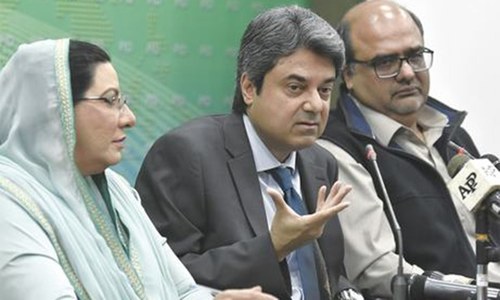ISLAMABAD: Justice Nazar Akbar — a member of the three-judge special court hearing the high treason case against Gen Pervez Musharraf who dissented with the majority judgement — observed in his verdict that the former dictator, with the help of then prime minister Shaukat Aziz and his cabinet, took advantage of the weak and opportunist elements in the judiciary to successfully extend his stay in the political office of president.
In his judgement, Justice Akbar held that the prosecution failed to make out the case of high treason against the accused, Gen Musharraf.
He observed that all the actions of Nov 3, 2007, when a state of emergency was proclaimed in the country, were political in nature and were taken by a civil government headed by the president, who alone was both the civilian as well as commander-in-chief of the armed forces.
Mr Aziz, as the chief executive of the country, had the support of the other pillars of state, including the parliament, according to the verdict.
Therefore, the assertions of the prosecution and the evidence presented by it could not be considered trustworthy for inflicting capital punishment on the accused, Justice Akbar observed.
Dissenting note says prosecution failed to make out high treason case
The acts of Nov 3, 2007 might be illegal, mala fide and unconstitutional, and even if they entailed any penal liability, the same in view of the quality of inquiry and evidence, could not be considered as an offence of high treason.
“Admittedly the words ‘high treason’ have not been defined in the Constitution or any other relevant laws,” Justice Akbar said, and compared the meaning of “high treason” as given under Article 6 with that explained in a commentary on the Constitution by Justice Mohammad Munir.
One could not conclude that the state of emergency imposed on Nov 3, 2007 was subversion or abrogation of the Constitution, the judge said, adding that neither was the Constitution replaced by any framework order nor had even its basic structure been changed.
Read: Full text of special court's verdict in Musharraf treason case
Moreover, the Proclamation of Emergency and the Provisional Constitution Order of 2007 had not adversely affected the political rights in parliament and powers to run the federal and the provincial governments. Therefore, one could safely say that the parliament, by first keeping silent on the matter and then amending Article 6 of the Constitution through the 18th Amendment, had betrayed the judiciary, which was the only target of the acts concerned.
There was not a single formal protest in the National Assembly or in any provincial assembly from the government benches or opposition parties over the legitimacy of the proclamation of emergency by the accused, the judgement said. Rather, evidence is available that shows the National Assembly through a resolution in its 44th Session on Nov 7 endorsed the proclamation of emergency.
“Many of the parliamentarians who were lawyers and were participating in the lawyers’ movement displayed no courage to make any motion in the parliament,” the judge said. “May be for fear that the scope of emergency may not be extended to the entire constitutional setup.”
The dissenting note said that parliament, in support of the earlier proclamation of emergency in October 1999, had applied the infamous “theory of necessity” by introducing the 17th Constitution Amendment to specifically favour the accused. And through the 18th Amendment, which amended Article 6, the parliament not only endorsed the National Assembly’s resolution of Nov 7, but also gave the verdict that Gen Musharraf’s acts of Nov 3 were not acts of high treason because such acts were not included in the definition of high treason in the Constitution prior to April 20, 2010.
Justice Akbar said the chosen representatives of the people, by suspending or holding in abeyance Article 63(1)(d) of the Constitution, had only one purpose before them: they wanted to declare that the people wanted to decorate the office of president with a serving general in violation of constitutional embargo on the person “holding an office of profit” to even become a member of parliament.
They knew that as a result of suspending Article 63(1)(d), even the basic structure of the Constitution could be changed and yet they did it, out of their personal need to retain their seats in parliament, the dissenting note said.
Many of the parliamentarians on the date of passage of the 18th Amendment were the same ones who were in parliament on the date of passing of 17th Amendment, when the act of abrogation and subversion of the Constitution through the Legal Framework Order was affirmed and acts of Gen Musharraf were not treated as high treason as if Article 6 was missing from the Constitution at the relevant time.
In fact, the parliament by amending the definition of high treason clearly approved and understood the definition of high treason as explained by Justice Munir in his commentary, the judge said.
Thus, the parliament by amending Article 6 left no room for the (special) court to charge the accused with an offence of high treason on account of his act of suspending and holding in abeyance certain provisions of the Constitution.
The note pointed out that former chief justice Abdul Hameed Dogar, despite the installation of a new government on March 25, 2008, completed his tenure until his age of superannuation on March 21, 2009.
Moreover, it is an open secret that Barrister Aitzaz Ahsan, who was spearheading the lawyers’ movement, received a phone call informing him that the judges would be reinstated before the next morning.
Why did the then prime minister address the nation on television at an odd hour to announce that former chief justice Iftikhar Muhammad Chaudhry would be reinstated after five days, the judgement recalled and asked why the restoration of the deposed judges was not done with immediate effect.
“Was it not postponed till the age of retirement of Justice Dogar?”
Published in Dawn, December 20th, 2019














































